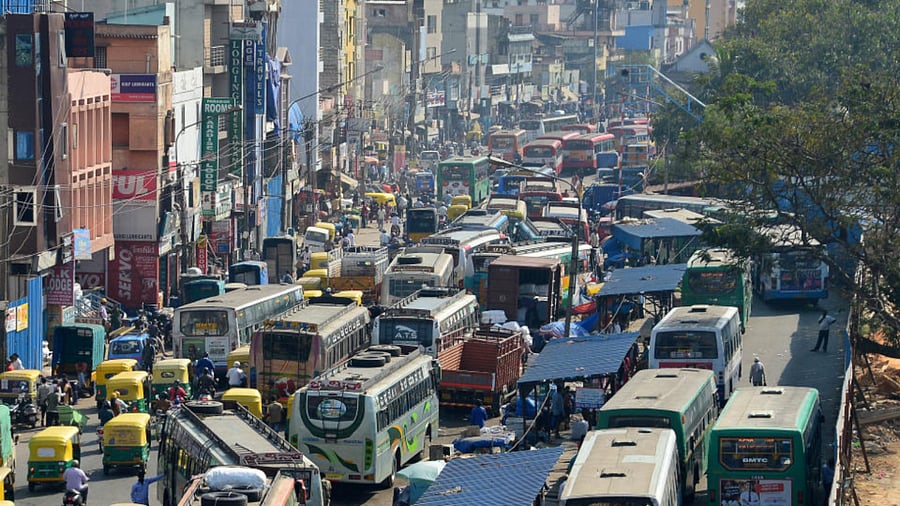
A newspaper headline earlier this month proclaimed that traders in Kalasipalyam Market were “upbeat” about moving to Electronic City. The news story stated that the Kalasipalyam wholesale fruit and vegetable market – some 400-odd sellers in all – would be moving to a larger space near Electronic City. The market was temporarily housed in E-City during the lockdown, and it has now been identified as permanent with the chief minister announcing it in the budget. It went on to say that the wholesale merchants’ association, which was earlier against the move, has now welcomed it, provided infrastructure -- roads, sheds, auction halls, toilets, parking, etc -- is provided.
Once again, residents of the area around the E-City plot have to come to know of the ‘development’ of the vegetable market through the press. In early April 2020, as the city went into lockdown, KR Market became a containment zone and Kalasipalyam Market was shut down. Overnight, it was moved temporarily to a site on Huskur Road, beyond Electronics City Phase 2. Residents of the area saw the ‘development’ appear abruptly and dramatically. Literally, one morning, a politician paid a visit to the site, and the next morning, the Kalasipalyam Market had moved in. Overnight, the vegetation, including trees, from the ‘empty’ site was destroyed; the site was razed with bulldozers; the fauna of the area fled into neighbouring community to save themselves, and loudspeakers started blaring loud messages and film music from a makeshift (and mostly empty) police booth on the site at 4 am in the morning, devastating the quiet of the area.
Located off Hosur Road, this area is largely rural, on the edge of the city and very peaceful. Suddenly, hundreds of trucks were rumbling down the narrow and totally inadequate roads (which at the best of times resemble the lunar landscape) and people were milling around, with no social distancing, and creating traffic jams. Chaos ensued. As the monsoon approached, the area became even worse. The temporary market was literally awash; vendors occupied the road, and it was impossible for residents to leave their homes. As abruptly as it had started, in August 2020, the temporary sheds were removed, and the ‘market’ disappeared. Residents could finally move around without being stuck in two-hour-long traffic jams in the area.
But here we go again! With this ‘little’ announcement in the paper, we are back to square one. No local resident was asked for their opinion: Were they happy with the vegetable market moving in? Did they want it there? Did they have any objection? The issue here is the process of this ‘development’. In yet another example of the opaque bureaucratic processes in place, made public through the press, the announcement has been made with absolutely no public consultation. The comments of the wholesale merchants’ association does not reflect the sentiments of the people of the area. They probably do not even reflect the sentiments of the smaller vendors that sell at Kalasipalyam Market. Of the 400-odd vendors at Kalasipalyam Market, how many can actually move to Electronic city? The bigger vendors can probably afford the move but many of the smaller vendors have lost livelihoods and business with the move. The voices of the smaller vendors and the local residents of the area need to be reflected in such a dramatic ‘development’.
Kalasipalyam is old and needs space; that is true. As a market servicing the city, it probably needs to be moved outside the city. The RMP 2031 identifies the Electronic City site within a Planning District (PD) with 21 villages, the Huskur village temple and industrial areas such as the Veerasandara Industrial Area, part of the Bommasandra Industrial Area and the APMC (Agriculture Produce Market Committee) fruit market. Currently, the roads in the area are in very poor condition and are barely adequate for traffic. If the vegetable market is developed on the site without extensive development of the roads and infrastructure of the region around, the quality of life in the area will be destroyed. Previously, residents have sat on the roads leading up to a solid waste management plant in the area to protest the living conditions there and to stop trucks carrying garbage from the city into the plant.
It is also the lack of accountability and highhandedness with which the process of transferring the market to Electronic city (during the height of the lockdown) has been conducted that is causing umbrage in the area. The lack of consultation with the local population is in complete contravention of the town-planning laws mandated by the state. Like other ‘developments’ across the city, there will be public protest, petitions, litigations, etc.
The need for systematic, legal, democratic and consultative channels (all mandated by state town-planning laws) through which citizens of all classes can participate in urban planning and governance is felt yet again. This is critical to reshaping modern-day Bengaluru. Hopefully, the state/BBMP will take note.
(The writer is an urban planner based in Bengaluru)